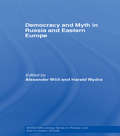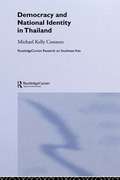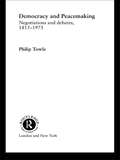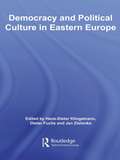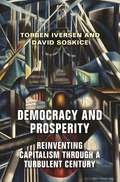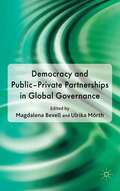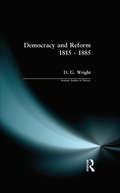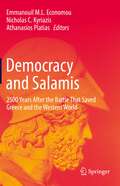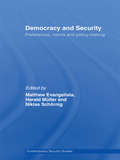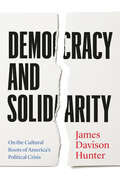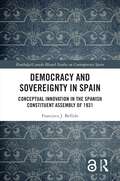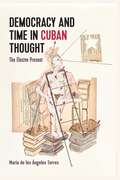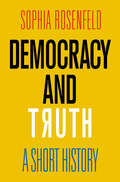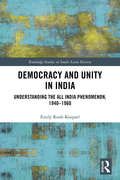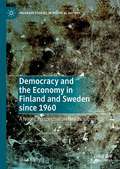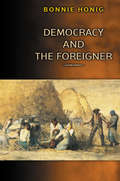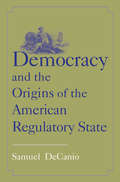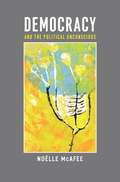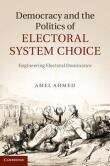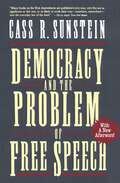- Table View
- List View
Democracy and Myth in Russia and Eastern Europe (BASEES/Routledge Series on Russian and East European Studies #Vol. 36)
by Harald Wydra Alexander WöllIn the absence of democratic state institutions, eastern European countries were considered to possess only myths of democracy. Working on the premise that democracy is not only an institutional arrangement but also a civilisational project, this book argues that mythical narratives help understanding the emergence of democracy without ‘democrats’. Examining different national traditions as well as pre-communist and communist narratives, myths are seen as politically fabricated ‘programmes of truth’ that form and sustain the political imagination. Appearing as cultural, literary, or historical resources, myths amount to ideology in narrative form, which actors use in political struggles for the sake of achieving social compliance and loyalty with the authority of new political forms. Drawing on a wide range of case studies including Ukraine, Russia, Poland, Hungary, and Czechoslovakia, this book argues that narratives about the past are not simply ‘legacies’ of former regimes but have actively shaped representations and meanings of democracy in the region. Taking different theoretical and methodological approaches, the power of myth is explored for issues such as leadership, collective identity-formation, literary representation of heroic figures, cultural symbolism in performative art as well as on the constitution of legitimacy and civic identity in post-communist democracies.
Democracy and National Identity in Thailand (Rethinking Southeast Asia #Vol. 7)
by Michael Kelly ConnorsThis book seeks to illuminate how Thai elites have used democracy as an instrument for order and discipline. Drawing on interviews, numerous Thai language sources, and critical theory, the author reveals a remarkable adaptation of the idea of democracy in the Thai context. Connors shows how elites have drawn on Western political theory to design projects to create modern citizens. He argues that it is possible to see the idea and practice of elite liberal democracy in Thailand, and elsewhere, as a key ideological resource in the project of securing hegemony over undisciplined populations. In this perspective the ideas of civil society, civic virtue, social capital and democracy itself are all part of the weaponry deployed in an effort to create 'good citizens', who act as guardians of the elite defined common good.
Democracy and Peace Making: Negotiations and Debates 1815-1973
by Philip TowleDemocracy and Peace Making is an invaluable and up-to-date account of the process of peace making, which draws on the most recent historical thinking. It surveys the post-war peace settlements of the nineteenth and twentieth centuries, including:* the Vienna congress of 1815* the Treaty of Versailles* the peace settlements of the Second World War* peace talks after the Korean War* the Paris Peace Accords of 1973.
Democracy and Political Culture in Eastern Europe (Routledge Research in Comparative Politics #Vol. 15)
by Jan Zielonka Hans-Dieter Klingemann Dieter FuchsWhat is the relationship between democracy and political culture in countries undergoing major systemic change? Have subjective political orientations of citizens been important in shaping the development of democracy in central and eastern Europe after the fall of communism? These core questions are tackled by an impressive range of twenty political scientists, sixteen of which are based in the central and eastern European countries covered in this essential new book. Their analyses draw on a unique set of data collected and processed by the contributors to this volume within the framework of the World Values Survey project. This data enables these authors to establish similarities and differences in support of democracy between a large number of countries with different cultural and structural conditions as well as historical legacies. The macro-level findings of the book tend to support the proposition that support of democracy declines the further east one goes. In contrast, micro-level relationships have been found to be astonishingly similar. For example, support of democracy is always positively related to higher levels of education – no matter where an individual citizen happens to live. This new book builds a clear understanding of what makes democracies strong and resistant to autocratic temptation.
Democracy and Prosperity: Reinventing Capitalism through a Turbulent Century
by Torben Iversen David SoskiceA groundbreaking new historical analysis of how global capitalism and advanced democracies mutually support each otherIt is a widespread view that democracy and the advanced nation-state are in crisis, weakened by globalization and undermined by global capitalism, in turn explaining rising inequality and mounting populism. This book, written by two of the world’s leading political economists, argues this view is wrong: advanced democracies are resilient, and their enduring historical relationship with capitalism has been mutually beneficial.For all the chaos and upheaval over the past century—major wars, economic crises, massive social change, and technological revolutions—Torben Iversen and David Soskice show how democratic states continuously reinvent their economies through massive public investment in research and education, by imposing competitive product markets and cooperation in the workplace, and by securing macroeconomic discipline as the preconditions for innovation and the promotion of the advanced sectors of the economy. Critically, this investment has generated vast numbers of well-paying jobs for the middle classes and their children, focusing the aims of aspirational families, and in turn providing electoral support for parties. Gains at the top have also been shared with the middle (though not the bottom) through a large welfare state.Contrary to the prevailing wisdom on globalization, advanced capitalism is neither footloose nor unconstrained: it thrives under democracy precisely because it cannot subvert it. Populism, inequality, and poverty are indeed great scourges of our time, but these are failures of democracy and must be solved by democracy.
Democracy and Public-Private Partnerships in Global Governance: The World Bank And The Post-washington Consensus In Southeast Asia (Critical Studies of the Asia-Pacific)
by M. Bexell U. MörthThere has been rapid proliferation of public–private partnerships in areas of human rights, environmental protection and development in global governance. This book demonstrates how different forms of partnership legitimacy and accountability interact, and pinpoints trade-offs between democratic values in partnership operations.
Democracy and Race: Asian Americans and World War II
by Ronald T. TakakiExperiences that Asian Americans had, during World War II.
Democracy and Reform 1815 - 1885 (Seminar Studies)
by D. G. WrightAn authoritative study of the bloodless revolution which transformed Britain's political system.
Democracy and Salamis: 2500 Years After the Battle That Saved Greece and the Western World
by Nicholas C. Kyriazis Emmanouil M. L. Economou Athanasios PlatiasIn this book, well-renowned international scholars discuss topics related to various aspects of the history of the Battle of Salamis, inspired by the democratic origins of the Greek naval victory at Salamis. They present deductions from the battle that can be useful for today, and seek answers for a more prosperous and brighter future for our societies. Their analyses are divided into five parts in the book: 1) The democratic implications of the Battle of Salamis; 2) The strategies that lead to monumental naval victories; 3) The institutional implications of the Battle of Salamis; 4) Various societal aspects of the Athenian democracy; 5) The interconnections between two glorious battles: Thermopylae and Salamis. This book is the first out of two edited volumes as a sequel of an international academic conference titled Salamis and Democracy: 2500 Years After that took place between October 3rd and October 5th, 2020, on the occasion of the 2500th anniversary of the great historical event of the Battle of Salamis, which saved Greek culture and the newly founded democratic regimes throughout the Hellenic world during the Classical period (508-323 BCE). The book is a must-read for scholars and students of history, political science, economics, and law, as well as policy-makers interested in a better understanding of classical, ancient, and political history, democracy, strategy, governance, and social choice.
Democracy and Schooling in California
by Kathleen WeilerHelen Heffernan and Corinne Seeds were nationally recognized as leaders of the progressive education movement and were key figures in what was probably the most concerted attempt to put the ideals of progressive education into practice in a state-wide system of public education in the United States. This book examines the struggle over public education in mid-twentieth century America through the lens of a joint biography of these two extraordinary women, Heffernan, the California Commissioner of Rural and Elementary Education between 1926 and 1965, and Seeds, the Director of the University Elementary school at UCLA between 1925 and 1957.
Democracy and Security: Preferences, Norms and Policy-Making (Contemporary Security Studies)
by Matthew Evangelista Niklas Schörnig Harald MüllerIt has become generally accepted wisdom that democracies do not go to war against each other. However, there are significant differences between democratic states in terms of their approach to war and security policy in general. This edited book offers a broad examination of how democratic preferences and norms are relevant to security policy beyond the decision of whether to go to war. It therefore offers a fresh understanding of state behaviour in the security realm. The contributors discuss such issues as defence policy, air war, cluster bombs, non-lethal weapons, weapons of mass destruction, democratic and non-democratic nuclear weapon states’ transparency, and the political and ideological background of the ongoing ‘Revolution in Military Affairs’. It has become generally accepted wisdom that democracies do not go to war against each other. However, there are significant differences between democratic states in terms of their approach to war and security policy in general.
Democracy and Solidarity: On the Cultural Roots of America's Political Crisis (Politics and Culture)
by James Davison HunterThe long-developing cultural divisions beneath our present political crisis Liberal democracy in America has always contained contradictions—most notably, a noble but abstract commitment to freedom, justice, and equality that, tragically, has seldom been realized in practice. While these contradictions have caused dissent and even violence, there was always an underlying and evolving solidarity drawn from the cultural resources of America&’s &“hybrid Enlightenment.&” James Davison Hunter, who introduced the concept of &“culture wars&” thirty years ago, tells us in this new book that those historic sources of national solidarity have now largely dissolved. While a deepening political polarization is the most obvious sign of this, the true problem is not polarization per se but the absence of cultural resources to work through what divides us. The destructive logic that has filled the void only makes bridging our differences more challenging. In the end, all political regimes require some level of unity. If it cannot be generated organically, it will be imposed by force. Can America&’s political crisis be fixed? Can an Enlightenment-era institution—liberal democracy—survive and thrive in a post-Enlightenment world? If, for some, salvaging the older sources of national solidarity is neither possible sociologically, nor desirable politically or ethically, what cultural resources will support liberal democracy in the future?
Democracy and Sovereignty in Spain: Conceptual Innovation in the Spanish Constituent Assembly of 1931 (Routledge/Canada Blanch Studies on Contemporary Spain)
by Francisco J. BellidoThis book delves into the conceptual changes produced by the Spanish constitutional debate held between 27 August and 9 December 1931. Taking place at the beginning of Spain’s Second Republic, those parliamentary deliberations brought about significant novelties in the political vocabulary. Concepts such as democracy, sovereignty, reform, revolution, and freedom, among others, were re-signified. This study investigates the conceptual contributions made by Spanish MPs in the course of the constitutional debate of 1931 by assuming, as a research approach, an interdisciplinary stance combining conceptual history, political theory, and parliamentary constitutional history. By doing so, it selects five determining issues: the pervasive discussion about two competing meanings of a democratic state; the rhetorical uses of reform and revolution; conceptual controversies about religious freedom; the disputed idea of property rights; and the functions of parliament and the president of the republic in a semi-presidential regime. The constitutional debate was largely inspired by interwar European constitutionalism which constituent representatives used to update the Spanish constitutional tradition. With that goal in mind, this book is aimed at undergraduate and graduate students and scholars working in the fields of conceptual history, political philosophy, parliamentary history, European political history, and European constitutionalism.
Democracy and Time in Cuban Thought: The Elusive Present
by María de los Ángeles TorresHow the temporalities of past, future, and present have been used in Cuban political rhetoric and expressed in Cuban culture In this fascinating analysis of political discourse in Cuban culture, María de los Ángeles Torres focuses on how the concept of time has been employed by different political projects. While the past and future are often evoked in rhetoric associated with authoritarianism, Torres argues, an emphasis on human actions in the present is important for a more democratic political culture, and she searches over a century of Cuban thought for this perspective. Delving into political texts and essays, literature, and art, Torres puts theories of temporalities in conversation with the Cuban experience. Torres closely examines the use of time and its political implications in Fidel Castro’s “History Will Absolve Me” speech, the writings of Jose Martí and Che Guevara, the poetry of Eliseo Diego and the Orígenes group, and paintings and performance art by Cuban exiles Nereida García Ferraz, María Martínez-Cañas, and Tania Bruguera. Recent events in Cuba have placed the search for democracy and social justice center stage, and Torres also studies the temporalities underpinning these movements, asking whether these projects are providing alternatives to overused past and future tropes. She suggests ways of thinking for today’s activists, encouraging them to remember history and imagine new possibilities while cultivating space for human agency now. Publication of this work made possible by a Sustaining the Humanities through the American Rescue Plan grant from the National Endowment for the Humanities.
Democracy and Truth: A Short History
by Sophia Rosenfeld"Fake news," wild conspiracy theories, misleading claims, doctored photos, lies peddled as facts, facts dismissed as lies—citizens of democracies increasingly inhabit a public sphere teeming with competing claims and counterclaims, with no institution possessing the authority to settle basic disputes in a definitive way.The problem may be novel in some of its details—including the role of political leaders, along with broadcast and digital media, in intensifying the epistemic anarchy—but the challenge of determining truth in a democratic world has a backstory. In this lively and illuminating book, historian Sophia Rosenfeld explores a longstanding and largely unspoken tension at the heart of democracy between the supposed wisdom of the crowd and the need for information to be vetted and evaluated by a learned elite made up of trusted experts. What we are witnessing now, under the pressure of populism, is the unraveling of the détente between these competing aspects of democratic culture.In four bracing chapters, Rosenfeld substantiates her claim by tracing the history of the vexed relationship between democracy and truth. She begins with an examination of the period prior to the eighteenth-century Age of Revolutions, where she uncovers the political and epistemological foundations of our democratic world. Subsequent chapters move from the Enlightenment to the rise of technocratic notions of democracy during the nineteenth century to the troubling trends—including the collapse of social trust—that have led to the rise of our "post-truth" public life. Rosenfeld concludes by offering suggestions for how to defend the idea of an extra-political truth against the forces that would undermine it.
Democracy and Unity in India: Understanding the All India Phenomenon, 1940-1960 (Routledge Studies in South Asian History)
by Emily Rook-KoepselThis book analyzes the ways in which organizations and individuals in India grappled with and contested definitions of democracy and unity in the decades directly preceding and following independent Indian statehood. The All India Scheduled Castes Federation and the All India Women’s Conference are used as case studies to explore Indian Dalit and women activists’ attempts to reconceptualize universal citizenship, Indian identity, dissent, and principled democracy during a moment of uncertainty in India’s political life. The author argues that, because the Indian nation and the Indian state remained in flux during the 1940s and '50s, marginal political actors, writers, social activists, and others were able to propose novel forms of democratic participation and new ideas about what it would mean to be a unified state that appreciates political responsibility, a respect for difference and a broader perspective of the population. Moreover, this book suggests that this redefinition of Indian politics is more widespread than generally understood and considers how strategies used by both organizations featured have continued to be part of the national story about democracy and dissent in India. Through an examination of public discourse, caste politics, women’s rights advocacy, and popular literature, this book excavates the traces of fundamental uncertainty regarding definitions and expectations of democracy and unity in India. It will be of interest to academics in the fields of modern South Asian history, democracy and nationalism, postcolonialism, gender studies, political organization, and global history.
Democracy and the Economy in Finland and Sweden since 1960: A Nordic Perspective on Neoliberalism (Palgrave Studies in Political History)
by Ilkka KärryläThis book explores the relationship between democracy and the economy in contemporary political thought and policy-making. Using the concepts of economic, industrial and enterprise democracy, the author focuses on the history of Finland and Sweden during the latter part of the twentieth century. The three concepts are discussed in relation to various political groups, such as social democrats, conservatives and liberals, and the reforms that they were associated with, painting a picture of changing economic thought in the Nordic countries, and the West more generally. Arguing that the concept of democracy has evolved from representative parliamentary democracy towards ‘participation’ in civil society, this book demonstrates how the ideal of individual freedom and choice has surpassed collective decision-making. These shared characteristics between Finland, Sweden and other Western countries challenge the view that the Nordic countries have been exceptional in resisting neoliberalism. In fact, as this book shows, neoliberalism has been influential to the Nordics since the 1970s. Offering an innovative and conceptual perspective on European political history, this book will appeal to scholars interested in Nordic political history and modern European history more generally.
Democracy and the Foreigner
by Bonnie HonigWhat should we do about foreigners? Should we try to make them more like us or keep them at bay to protect our democracy, our culture, our well-being? This dilemma underlies age-old debates about immigration, citizenship, and national identity that are strikingly relevant today. In Democracy and the Foreigner, Bonnie Honig reverses the question: What problems might foreigners solve for us? Hers is not a conventional approach. Instead of lauding the achievements of individual foreigners, she probes a much larger issue--the symbolic politics of foreignness. In doing so she shows not only how our debates over foreignness help shore up our national or democratic identities, but how anxieties endemic to liberal democracy themselves animate ambivalence toward foreignness. Central to Honig's arguments are stories featuring ''foreign-founders,'' in which the origins or revitalization of a people depend upon a foreigner's energy, virtue, insight, or law. From such popular movies as The Wizard of Oz, Shane, and Strictly Ballroom to the biblical stories of Moses and Ruth to the myth of an immigrant America, from Rousseau to Freud, foreignness is represented not just as a threat but as a supplement for communities periodically requiring renewal. Why? Why do people tell stories in which their societies are dependent on strangers? One of Honig's most surprising conclusions is that an appreciation of the role of foreigners in (re)founding peoples works neither solely as a cosmopolitan nor a nationalist resource. For example, in America, nationalists see one archetypal foreign-founder--the naturalized immigrant--as reconfirming the allure of deeply held American values, whereas to cosmopolitans this immigrant represents the deeply transnational character of American democracy. Scholars and students of political theory, and all those concerned with the dilemmas democracy faces in accommodating difference, will find this book rich with valuable and stimulating insights.
Democracy and the Limits of Self-Government
by Adam PrzeworskiThe political institutions under which we live today evolved from a revolutionary idea that shook the world in the second part of the eighteenth century: that a people should govern itself. Yet if we judge contemporary democracies by the ideals of self-government, equality, and liberty, we find that democracy is not what it was dreamt to be. This book addresses central issues in democratic theory by analyzing the sources of widespread dissatisfaction with democracies around the world. With attention throughout to historical and cross-national variations, the focus is on the generic limits of democracy in promoting equality, effective participation, control of governments by citizens, and liberty. The conclusion is that although some of this dissatisfaction has good reasons, some is based on an erroneous understanding of how democracy functions. Hence, although the analysis identifies the limits of democracy, it also points to directions for feasible reforms.
Democracy and the Origins of the American Regulatory State
by Samuel DecanioPolitical scientist Samuel DeCanio examines how political elites used high levels of voter ignorance to create a new type of regulatory state with lasting implications for American politics. Focusing on the expansion of bureaucratic authority in late-nineteenth-century America, DeCanio's exhaustive archival research examines electoral politics, the Treasury Department's control over monetary policy, and the Interstate Commerce Commission's regulation of railroads to examine how conservative politicians created a new type of bureaucratic state to insulate policy decisions from popular control.
Democracy and the Political Unconscious
by Noelle McafeePolitical philosopher Noelle McAfee proposes a powerful new political theory for our post-9/11 world, in which an old pathology-the repetition compulsion-has manifested itself in a seemingly endless war on terror. McAfee argues that the quintessentially human desire to participate in a world with others is the key to understanding the public sphere and to creating a more democratic society, a world that all members can have a hand in shaping. But when some are effectively denied this participation, whether through trauma or terror, instead of democratic politics, there arises a political unconscious, an effect of desires unarticulated, failures to sublimate, voices kept silent, and repression reenacted. Not only is this condition undemocratic and unjust, it may lead to further trauma. Unless its troubles are worked through, a political community risks continual repetition and even self-destruction. McAfee deftly weaves together her experience as an observer of democratic life with an array of intellectual schemas, from poststructural psychoanalysis to Rawlsian and Habermasian democratic theories, as well as semiotics, civic republicanism, and American pragmatism. She begins with an analysis of the traumatic effects of silencing members of a political community. Then she explores the potential of deliberative dialogue and other "talking cures" and public testimonies, such as the South African Truth and Reconciliation Commission, to help societies work through, rather than continually act out, their conflicts. Democracy and the Political Unconscious is rich in theoretical insights, but it is also grounded in the practical problems of those who are trying to process the traumas of oppression, terror, and brutality and create more decent and democratic societies. Drawing on a breathtaking range of theoretical frameworks and empirical observations, Democracy and the Political Unconscious charts a course for democratic transformation in a world sorely lacking in democratic practice.
Democracy and the Political Unconscious (New Directions in Critical Theory #10)
by Noëlle McAfeePolitical philosopher Noëlle McAfee proposes a powerful new political theory for our post-9/11 world, in which an old pathology-the repetition compulsion-has manifested itself in a seemingly endless war on terror. McAfee argues that the quintessentially human desire to participate in a world with others is the key to understanding the public sphere and to creating a more democratic society, a world that all members can have a hand in shaping. But when some are effectively denied this participation, whether through trauma or terror, instead of democratic politics, there arises a political unconscious, an effect of desires unarticulated, failures to sublimate, voices kept silent, and repression reenacted. Not only is this condition undemocratic and unjust, it may lead to further trauma. Unless its troubles are worked through, a political community risks continual repetition and even self-destruction.McAfee deftly weaves together her experience as an observer of democratic life with an array of intellectual schemas, from poststructural psychoanalysis to Rawlsian and Habermasian democratic theories, as well as semiotics, civic republicanism, and American pragmatism. She begins with an analysis of the traumatic effects of silencing members of a political community. Then she explores the potential of deliberative dialogue and other "talking cures" and public testimonies, such as the South African Truth and Reconciliation Commission, to help societies work through, rather than continually act out, their conflicts. Democracy and the Political Unconscious is rich in theoretical insights, but it is also grounded in the practical problems of those who are trying to process the traumas of oppression, terror, and brutality and create more decent and democratic societies. Drawing on a breathtaking range of theoretical frameworks and empirical observations, Democracy and the Political Unconscious charts a course for democratic transformation in a world sorely lacking in democratic practice.
Democracy and the Politics of Electoral System Choice
by Amel AhmedAmel Ahmed brings new historical evidence and a novel theoretical framework to bear on the study of democratization. Looking at the politics of electoral system choice at the time of suffrage expansion among early democratizers, she shows that the electoral systems used in advanced democracies today were initially devised as exclusionary safeguards to protect pre-democratic elites from the impact of democratization and, particularly, the existential threat posed by working class mobilization. The ubiquitous use and enduring nature of these safeguards calls into question the familiar picture of democracy moving along a path of increasing inclusiveness. Instead, what emerges is a picture that is riddled with ambiguity, where inclusionary democratic reforms combine with exclusionary electoral safeguards to form a permanent part of the new democratic order. This book has important implications for our understanding of the dynamics of democratic development both in early democracies and in emerging democracies today.
Democracy and the Politics of Silence (Rhetoric and Democratic Deliberation)
by Mónica Brito VieiraMost people equate democracy with discussion, speech, and making one’s voice heard. But where does silence fit in? Democracy and the Politics of Silence investigates the largely overlooked role of silence in democratic politics. It challenges conventional wisdom by arguing that silence can support and affirm democratic pillars and outcomes like empowerment, inclusion, and equality.The book focuses on a particular set of problems concerning the relationship between political silence and the democratic triad of voice, agency, and representation. Each of the book’s chapters draws on a selection of hand-picked case studies, both historical and contemporary, including the NAACP’s Silent Parade in 1917, demonstrations by the Women in Black, Spain’s post-Franco Pact of Forgetting, Trump’s silent majority, debates related to the representation of nonhuman beings, and the famous Miranda judgment on the right to silence. Together they offer an innovative, ambitious investigation of democratically undesirable silences and practices of silence that are powerfully affirmative of democratic subjectivities, aims, and norms. In thus expanding the repertoire of democratic citizenship, Mónica Brito Vieira invites readers to consider what silence might teach them about democracy.This timely book should appeal to political science students and scholars as well as anyone interested in the history of democracies and popular resistance movements.
Democracy and the Problem of Free Speech
by Cass R. SunsteinFreedom of speech is one of our greatest legal rights and Cass Sunstein is one of our greatest legal theorists. This book is a must read for anyone who wants to think seriously about the free speech issues facing this generation.-- Akhil Amar, Southmayd Professor, Yale Law SchoolThis is an important book. Beautifully clear and carefully argued, Sunstein's contribution reaches well beyond the confines of academic debate. It will be of interest to any citizen concerned about freedom of speech and the current state of American democracy.-- Joshua Cohen, Massachusetts Institute of TechnologyHow can our constitutional protection of free speech serve to strengthen democracy? Cass Sunstein challenges conventional answers with a remarkable array of lucid arguments and legal examples. There is no better book on the subject.-- Amy Gutmann, Laurance S. Rockefeller University Professor, Princeton University
